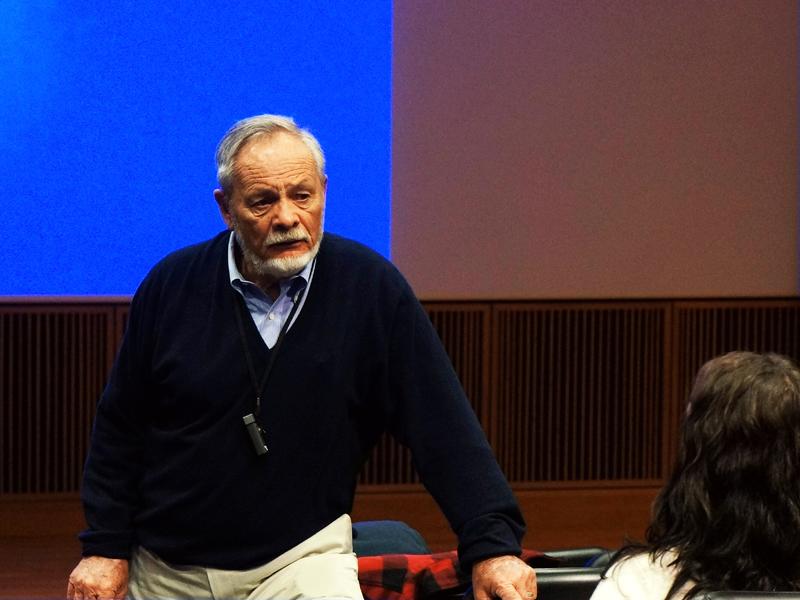Blending a mixture of history, archeology and entertaining stories, Brian Fagan, professor emeritus of anthropology at the University of California- Santa Barbara, spoke to students and faculty Thursday night in the Monsanto Auditorium.
The lecture, supported by the Nelson Lecture Fund, the department of anthropology and the Howard Hughes Medical Institute Program, was held to demonstrate the importance of communicating science to the general public.
Beginning with his experience in Zambia, Fagan shared several anecdotes about his career, delving into his life as a professor and ending with a comical tale about his time on “The Daily Show with Jon Stewart.”
“I have carved out a somewhat distinctive career compared with the normal specialized academic,” Fagan said.
Dr. Susan Renoe of the Broader Impacts Network, who is a former Ph.D. student of Fagan’s, contacted him in hopes that he would speak to her class on public archeology.
“Originally I had asked him if he would Skype in and he said ‘No, come bring me out!’ which has actually turned out to be a thousand times better,” Renoe said.
Fagan is a New York Times bestselling author. He has written or edited more than 40 books on topics ranging from history to climate change, including several textbooks that are used in archeology classrooms all over the country. Fagan has a book coming out in June that will focus on the rise of sea levels.
“I was doing this many years before communicating science to the public became the issue it is now,” Fagan said.
Fagan also said this issue is becoming more crucial as time goes on.
“The most horrible thing we can have is a society that’s ignorant,” Fagan said. “You’re dealing with a dilemma where there’s a great deal of very important research to be done and there’s a public out there that has very little comprehension as to why we’re doing it and why it’s important.”
Renoe said she believes that Fagan’s lecture was a learning experience for many students.
“The students in my class are interested in communication of science,” Renoe said. “They’re interested in how we communicate complex ideas in coherent and intelligible ways, especially for a lay audience. He gave them lots of good tips on how to do that and how to write effectively.”
Senior Kathryn Domagalski said she had the opportunity to listen to Fagan speak twice, once in class and once during the lecture.
“Honestly, he’s probably the best speaker I’ve had,” Domagalski said. “Not only is he very intellectual and insightful, but he was very personal.”
Many of those who attended the lecture said they gained a new outlook on science in general.
“He really emphasized it’s more about the people instead of artifacts,” Domagalski said. “I think that’s one thing I’ll take away from this.”
Fagan said he does not plan on stopping anytime soon, with trips to North Carolina and China in his future.
“This is an extremely time-consuming life and I’m just going to keep going,” Fagan said. “Academics don’t retire.”






